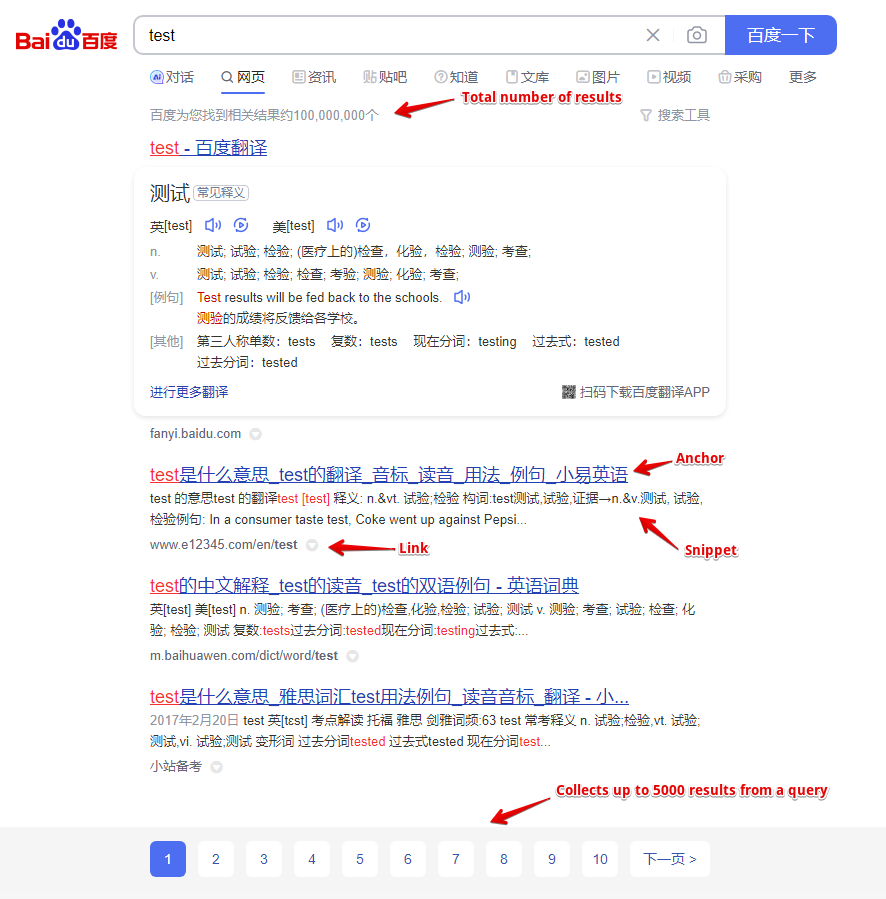SE::Baidu - Baidu Search Results Scraper

Baidu Scraper Overview
Baidu SERP Scraper. Thanks to the Baidu scraper, you can obtain huge link databases ready for further use. You can use queries in the same format you enter them into the Bing search bar, including search operators (filetype, site, intitle).
A-Parser functionality allows you to save Baidu scraper settings for future use (presets), set scraping schedules, and much more. You can use automatic query multiplication, substitution of sub-queries from files, iteration of alphanumeric combinations, and lists to get the maximum possible number of results.
In the Baidu scraper, results can be saved in the required format and structure thanks to the powerful built-in templating engine Template Toolkit which allows applying additional logic to results and outputting data in various formats, including JSON, SQL and CSV.
Scraper Application Cases
🔗 Scraping Full Baidu Links
This resource shows how to scrape full links
🔗 Baidu Suggestions
Multi-level scraping of Baidu suggestions
🔗 JS JS Scraper JS::SE::Baidu::Suggest
Creating JS Scrapers. Getting Baidu Suggestions
Collected Data
- Links
- Snippets
- Anchors
- Total number of results
- List of related keywords
- Number of SERP pages

Capabilities
- Scrapes up to 5000 results per query
- Supports all Baidu search operators (filetype:, site:, intitle:).
- Collects SERP results and related keywords
- Converts shortened links to full ones (option Get full links)
Use Cases
- Collecting link databases - for A-Poster, XRumer, AllSubmitter, etc.
- Keyword competition assessment
- Website indexation check
- Collecting pages containing specified keywords in the page title
Queries
Search phrases must be specified as queries, for example:
test
site:www.baidu.com
百度产品大全
intitle:scraper
Query Macros
You can use built-in macros to multiply queries, for example, if we want to get a very large database of forums, we specify several main queries in different languages:
forum
forum
foro
论坛
In the query format, we specify character iteration from a to zzzz, this method allows maximum rotation of the search results and obtaining many new unique results:
$query {az:a:zzzz}
This macro will create 475254 additional queries for each original search query, which totals 4 x 475254 = 1901016 search queries, an impressive number, but that's no problem for A-Parser. At a speed of 2000 queries per minute, such a task will be processed in just 16 hours.
Using Operators
You can use search operators in the query format, so it will be automatically added to every query in your list:
site:$query
Output Results Examples
A-Parser supports flexible results formatting thanks to the built-in templating engine Template Toolkit, which allows it to output results in any desired form, including structured formats like CSV or JSON
Exporting Link List
Links + Anchors + Snippets with position output
Outputting links, anchors, and snippets into a CSV table
Saving Related Keywords
Keyword Competition
Checking Link Indexation
Saving in SQL Format
Dumping Results to JSON
Results Processing
A-Parser allows you to process results directly during scraping, in this section we have provided the most popular use cases for the Baidu scraper
Link Deduplication
Link Deduplication by Domain
Extracting Domains
Removing Tags from Anchors and Snippets
Filtering Links by Inclusion
Possible Settings
| Parameter Name | Default Value | Description |
|---|---|---|
| Pages count | 5 | Number of pages to scrape (from 1 to 100) |
| Links per page | 50 | Number of links per page in the SERP (10 / 20 / 50) |
| Get full links | ☐ | Convert shortened links to full ones (off by default) |